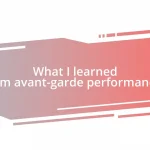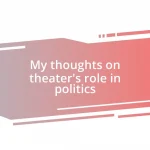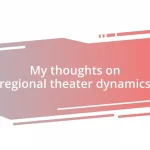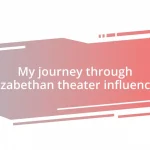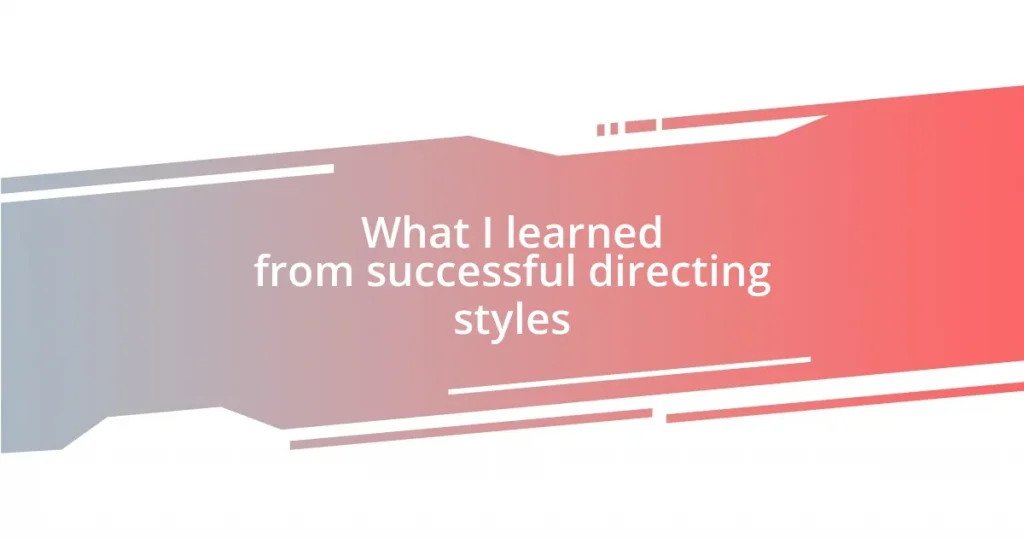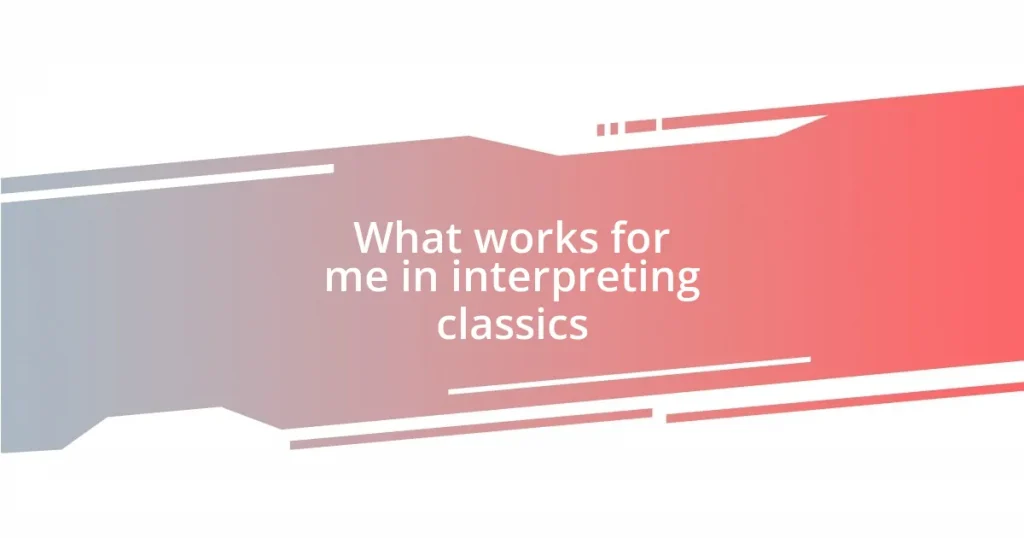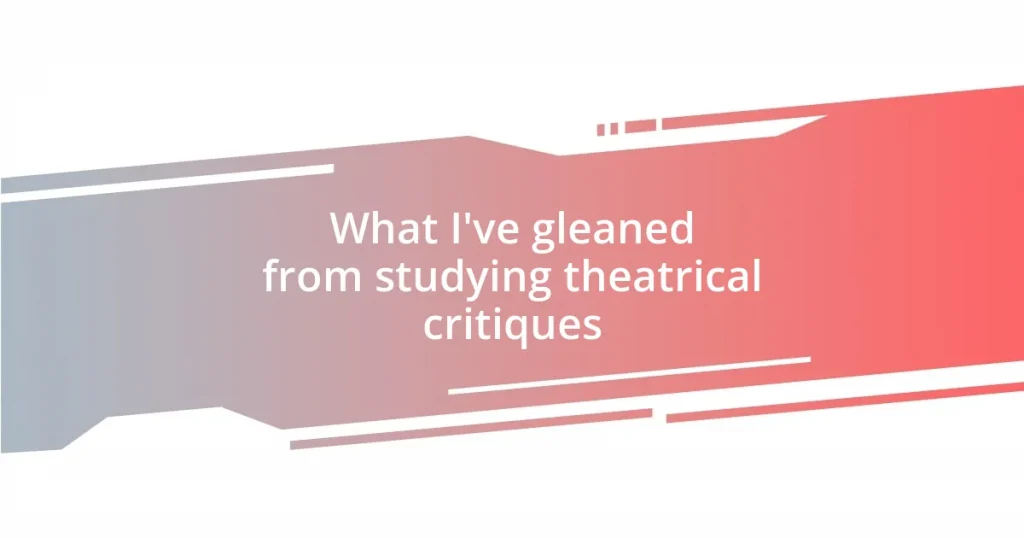Key takeaways:
- First-time actors experience a blend of excitement and anxiety, showcasing eagerness to learn and grow in their craft.
- Creating a supportive environment, practical guidance, and playful practices like improv can boost confidence and foster camaraderie among novice actors.
- Building trust through shared vulnerabilities and active listening cultivates a strong connection among actors, enhancing their performance experience.
- Celebrating small wins and providing ongoing feedback cultivates a positive atmosphere, encouraging long-term engagement and personal growth.

Understanding First-time Actors
First-time actors often find themselves in a whirlwind of emotions. I remember my own debut vividly; the excitement was palpable, but so was the anxiety. Have you ever felt your heart race just before stepping onto a stage? That feeling, like a rollercoaster, is common for newcomers.
What strikes me about first-time actors is their raw energy and eagerness to learn. I once worked with a group of fresh talents, and their questions were both innocent and profound. Each inquiry about character development reminded me of my own journey and how much room there is for growth. Isn’t it fascinating how new perspectives can really transform a performance?
Many first-timers grapple with self-doubt, often wondering if they truly belong in this world of make-believe. I recall a young actress who nearly backed out just moments before her first scene, overwhelmed by the thought of being judged. It’s a reminder that even the most talented performers started where they are now. How do we reassure them that vulnerability is part of the art? I believe nurturing an environment where they feel safe to express themselves is crucial.

Preparing for First-time Actors
Preparing first-time actors is like setting the stage for a beautiful performance. One essential step I always emphasize is creating a supportive atmosphere. In my early days, I had a mentor who took the time to share personal stories of his first performances, creating a bond of trust. I really felt like I could be open about my fears, and that made a world of difference. Is there anything more reassuring than knowing someone else has walked the same path?
In addition, I’ve learned that preparation involves not just emotional support but also practical guidance. When I started, the thought of memorizing lines felt like climbing a mountain. I found that breaking the text into manageable chunks was incredibly helpful. It allowed me to focus on small victories, boosting my confidence. Have you ever tried tackling a big project piece by piece? It’s a game-changer.
Lastly, instilling a sense of playfulness can transform the experience for first-time actors. I once organized a warm-up session that involved improv games, which not only loosened up the group but also fostered camaraderie. I remember one evening; a shy actor broke out of his shell and made everyone laugh. Those moments create memories that stick and encourage growth. In acting, isn’t it vital to find joy in the process?
| Preparation Aspect | My Experience |
|---|---|
| Supportive Environment | Having a mentor share personal stories eased my fears. |
| Practical Guidance | Breaking lines into chunks helped boost my confidence. |
| Playfulness in Practice | Improv games fostered camaraderie and broke the ice. |

Effective Techniques for Coaching
Effective Techniques for Coaching
Coaching first-time actors requires a blend of empathy and strategy. One technique that I found particularly effective is using visualization exercises. I vividly remember guiding a nervous actor to close their eyes and imagine stepping onto the stage, breathing in the audience’s energy. It was fascinating to see how their posture relaxed and confidence seemed to bloom right before my eyes. Engaging their imaginations opens up a world of possibilities and helps them feel grounded in the moment.
- Visualization Techniques: Encourage actors to visualize their success on stage, enhancing their confidence.
- One-on-One Feedback: I schedule individual sessions to offer personalized feedback; this helps them feel valued and understood.
- Positive Reinforcement: Celebrating small wins is crucial. I always emphasize progress, whether it’s nailing a line or connecting with their character.
- Character Exploration: I recall facilitating a character exploration session where I asked actors to write about their character’s backstory. This exercise deepened their connection and made their performances more authentic.
I believe these methods create a rich learning environment. The goal is to empower them to express their artistry freely. Have you seen how a little encouragement can unlock potential? It’s profoundly rewarding to witness.

Building Trust with New Actors
Establishing trust with new actors is crucial, and I often start by sharing my own vulnerabilities. Once, during a rehearsal, I openly admitted my struggles with self-doubt, which led to an unexpected moment of connection. That honesty encouraged the actors to share their own fears, reminding me of how even the most seasoned performers sometimes feel like impostors. Isn’t it refreshing to know that we’re all in this together?
Listening is another powerful way to build trust. During my first few sessions with new actors, I dedicated time to just hear their stories and aspirations. I remember one young actor sharing her dream of performing a Shakespearean monologue, and it was so inspiring. In that moment, I felt the energy shift; her excitement ignited a spark of motivation in the entire group. Have you ever felt that shift when someone opens up? It’s incredibly contagious.
Finally, I find that creating collaborative goals fosters a deeper sense of trust. For instance, I once invited a group of first-timers to set personal acting objectives together. That led to animated discussions about character choices and scene dynamics. Their enthusiasm was palpable, and it laid a foundation for teamwork. In those moments, the actors weren’t just participants anymore; they were co-creators in their journey. How empowering is it to find a shared path in the artistry of performance?

Common Challenges with Beginners
First-time actors often grapple with their insecurities. I remember one particularly anxious beginner who fumbled through her lines, her cheeks flushed with embarrassment. It’s heart-wrenching to see that fear shadow their talent. I’ve learned that these doubts are universal, and creating a safe space for them is essential. Have you ever noticed how the weight of expectations can feel so heavy?
Another common challenge is understanding stage directions. I once worked with a new actor who kept stepping out of character because he wasn’t entirely sure where to go during certain scenes. It took a few warm-up exercises, along with clear, simple explanations of practical movements, to help him navigate his role more confidently. The transformation was remarkable—seeing him own the stage was a reminder that patience is key. Isn’t it amazing how clarity can spark newfound freedom in performance?
Additionally, building chemistry with fellow actors can be tricky for beginners. I recall a rehearsal where two first-timers struggled to connect; their scenes felt forced and disconnected. It was only when I introduced improvisational trust exercises that they found their rhythm. The laughter that followed created an instant bond between them. Have you seen how a little playfulness can bridge gaps in confidence? These moments of connection are vital for meaningful performances.

Celebrating Small Wins Together
Celebrating small wins is such a joyful part of working with first-time actors. I remember the exhilaration in the room when one actor finally nailed a difficult scene. The look on her face was pure relief mixed with triumph. We all cheered, and it felt like a shared victory, reinforcing our bond. Doesn’t it feel amazing when hard work pays off, no matter how small the achievement?
In another instance, a newcomer successfully delivered her first line after weeks of practice. It wasn’t just about the line; it was about her newfound confidence. I called for an impromptu celebration right then and there—snacks, laughter, and all! Those simple moments remind us that each step forward, however minor, deserves recognition. Have you ever experienced that rush of excitement when a teammate achieves something they’ve been striving for?
One of my favorite traditions is creating “win jars” where we jot down our small successes throughout the rehearsal process and revisit them during our final performance. One night, I read a note from an actor who had overcome a significant fear of performing in front of others. Seeing her face light up as I read her achievement sparked a collective moment of pride in our group. It’s incredible how celebrating together can not only lift spirits but also strengthen our collective resolve. Don’t you find that these shared moments foster a sense of unity that carries us through challenges?

Tips for Long-term Engagement
Engaging first-time actors over the long term requires a genuine commitment to their growth. I recall organizing a weekly feedback session where everyone could share not only constructive criticism but also moments of inspiration. This collective reflection transformed hesitance into enthusiasm, as it allowed each actor to feel heard and valued. How powerful is it to create an environment where vulnerability is met with encouragement?
Another strategy I’ve found effective is incorporating regular check-ins, even outside rehearsals. Once, I set up a casual coffee meet-up with a group of newcomers to discuss their individual journeys and aspirations. Hearing them articulate their fears and dreams in a relaxed setting fostered a sense of community that extended to our practices. Have you ever noticed how a simple gesture like this can melt away walls that often segregate newcomers from their peers?
Moreover, I believe in the power of ongoing education. I once suggested a workshop series led by experienced actors, and the transformation was astonishing. Not only did they gain new insights, but the camaraderie that developed from learning together invigorated their performances. Isn’t it incredible how shared experiences and continuous learning can fuel a deeper passion for the craft?




